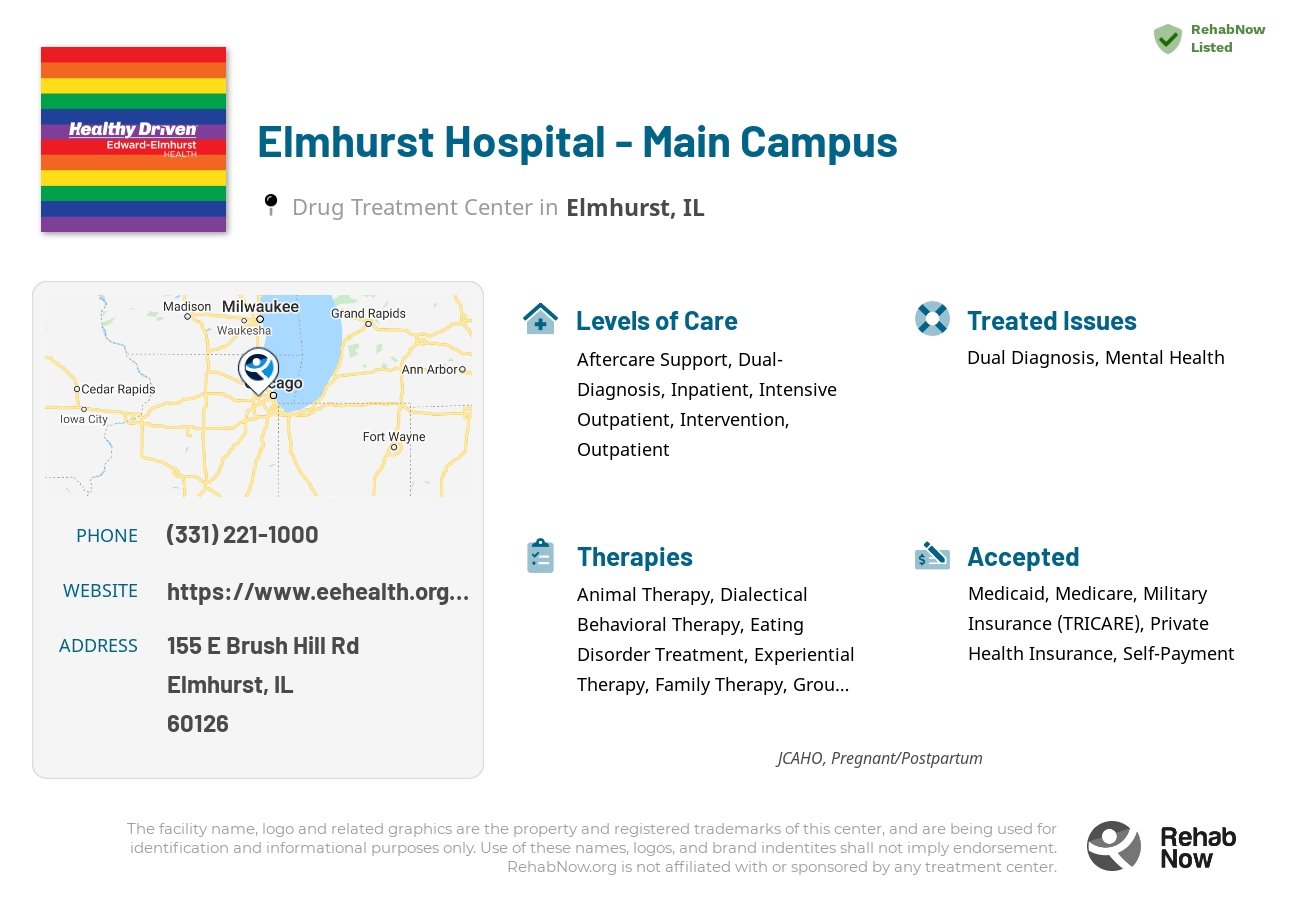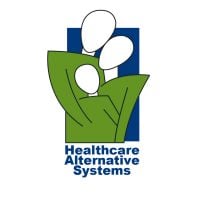Elmhurst Hospital - Main Campus
Drug Rehab Center in Elmhurst, Illinois
Elmhurst Hospital - Main Campus is a JCAHO accredited drug rehab facility located in Elmhurst, IL that provides comprehensive treatment for individuals suffering from addiction and other mental health issues through evidence-based practices and supportive family engagement.
About This Elmhurst, IL Facility
Elmhurst Hospital - Main Campus, located in Elmhurst, Illinois, is a comprehensive addiction treatment facility focused on providing compassionate care for those struggling with substance abuse and mental health issues. The hospital offers inpatient and outpatient programs, as well as recovery services for depression, eating disorders, and more.
Edward-Elmhurst Health, the larger integrated health system that operates the facility, was formed through the merger of Edward Hospital and Elmhurst Memorial Healthcare in 2013. Their mission is to provide high-quality, patient-centered care to the communities they serve.
Accredited by the Joint Commission on Accreditation of Healthcare Organizations (JCAHO), Elmhurst Hospital - Main Campus offers a range of evidence-based therapies and programs tailored to each individual's needs. These include cognitive behavioral therapy, dialectical behavior therapy, and medication-assisted treatment. The 259-bed facility provides various levels of care, such as intensive outpatient, aftercare support, intervention, inpatient, and detox services.
- Experienced and highly trained staff
- Individualized recovery plans
- Comprehensive care for dual diagnosis and co-occurring disorders
Elmhurst Hospital - Main Campus specializes in treating addictions to alcohol, drugs, opioids, as well as addressing mental health conditions like depression and eating disorders.
Genders
Ages
Modality
Additional
Accreditations

JCAHO
Conditions and Issues Treated
Opioid addiction treatment facilities like Elmhurst Hospital - Main Campus support people struggling with opioid dependency, which covers illegal and prescription opioids. People often abuse prescription opioids to get high instead of adhering to a medical provider’s directions. Addiction forces people to crave for opioids impulsively without factoring in the dangers these drugs bring to them.
Most opioid addiction treatment plans include detoxification and subsequent medications to ease the process. However, that’s only the beginning. Behavioral therapies and counseling are also necessary to resolve the root cause of addiction. This overall approach decreases the likelihood of falling off the wagon. In some instances, therapies can be done at home.
An underlying cause often brings about addiction. Mental disorders can lie at the center, such as schizophrenia, bipolar disorder or anxiety disorder. As well as the cause of the addiction, a dual diagnosis by Elmhurst Hospital - Main Campus helps to treat the addiction. This ensures that after treatment is complete, the patient will not fall back on old practices.
Levels of Care Offered
This center offers a variety of custom treatment tailored to individual recovery. Currently available are Aftercare Support, Detox, Dual-Diagnosis, Inpatient, Intensive Outpatient, Intervention, Outpatient, with additional therapies available as listed below.
Detoxification is the first step in drug addiction treatment. A controlled environment where symptoms can be managed with medication and close observation is provided by drug detoxification. Detoxification is an essential step in the recovery process, but it is also one of the most dangerous. Due to the potential danger, it’s critical to understand what detoxification is and how to complete it safely.
Detoxification usually includes:
- Medical supervision.
- Medication to ease withdrawal symptoms.
- Drug testing to track progress.
- Counseling.
Inpatient treatment for addiction is generally not as scary as it might sound. It is a way to find recovery while being in a supportive and controlled environment. The duration of treatment at Elmhurst Hospital - Main Campus in Elmhurst can be different based on each individual. Many can leave after 28 days; some may stay a few months, and others may stay six months or longer.
Elmhurst Hospital - Main Campus offers an Intensive Outpatient Program is for those who need intensive care but prefer to spend the majority of their time in the comfort of their own home. The rehabilitation services differ in length and intensity. They are customized to meet the needs of the patient.
When remaining at their job in Elmhurst, or continuing their studies, the individual may live with their family while utilizing Elmhurst Hospital - Main Campus‘s outpatient services. Treatment requires counseling the patient at the individual level, in a group setting, about substance addiction, drugs, and therapy sessions.
Typically, people engaged in drug addiction are in a state of denial about the adverse consequences of their altered behavior. They feel that on their own, they can conquer the addiction. Intervention programs in Illinois manged by Elmhurst Hospital - Main Campus allow family members to encourage the person affected to seek external assistance.
Help with aftercare applies to the follow-up care provided after the initial recovery program offered by Elmhurst Hospital - Main Campus in Elmhurst, IL. The level of support for aftercare plays a vital role in avoiding relapse and in maintaining sobriety. Aftercare support is tailored according to the patient’s needs.
Elmhurst Hospital - Main Campus‘s Therapies & Programs
Patients who receive generous support from their loved ones have better chances of completing their recovery. Genetics play a role when it comes to addiction, so it’s better to approach the problem as a unit. Family members can help an individual avoid addiction triggers and guide him or her in making lifestyle changes.
Group therapy is a type of counseling at Elmhurst Hospital - Main Campus in Elmhurst, IL that occurs between a bunch of strangers. The goal of group therapy sessions is to foster hope and a sense of belonging. It also helps to have people who can relate to what you’re going through. Good behaviors can also be contagious.
As a means of managing pain that has plagued them in the past, many individuals turn to drugs and alcohol. Assault, negligence, the loss of a loved one, and other unfortunate events may involve trauma. This treatment, offered and administrated by Elmhurst Hospital - Main Campus in Elmhurst, IL provides individuals the resources to cope with past traumas healthily.
Dialectical behavioral therapy focuses on eliminating negative thoughts such as suicidal thoughts. It is useful in the treatment of patients with uncontrollable emotions. The term “dialectic” means the integration of opposites. In the substance abuse context, DBT refers to accepting the patient’s addiction.
Life skills training helps the recovering person gain the skills and confidence necessary to function well in the world. Life skills training focuses on practical activities like cooking, job seeking, social interactions, and money management. This kind of training at Elmhurst Hospital - Main Campus helps fill in the gaps caused by addiction with useful, immediately usable skills.
Patient Experience
Experiential Therapy at Elmhurst Hospital - Main Campus
Experiential therapy involves having patients work through mental issues by engaging in real time activities. It moves away from traditional talk therapy having patients role play or use props to explore their issues and emotions. This treatment process, available at Elmhurst Hospital - Main Campus, helps people process trauma and emotion in a healthier fashion eliminating the need to turn to drugs and alcohol.
Payment Options Accepted
For specific insurance or payment methods please contact us.
Is your insurance accepted?
Ask an expert, call (888) 674-0062
Elmhurst Hospital Associated Centers
Discover treatment facilities under the same provider.
- Linden Oaks Behavioral Health - Naperville Outpatient Center in Naperville, IL
- Linden Oaks Behavioral Health - Naperville Main Inpatient Campus in Naperville, IL
Learn More About Elmhurst Hospital Centers
Additional Details
Specifics, location, and helpful extra information.
Elmhurst, Illinois 60126 Phone Number(331) 221-1000 Meta DetailsUpdated April 15, 2024
Staff Verified
Patient Reviews
There are no reviews yet. Be the first one to write one.
Elmhurst, Illinois Addiction Information
In 2016, more than 2,350 Illinoisans died from drug overdoses. More than 5,500 deaths annually occur in Illinois due to the abuse of alcohol and other drugs. 7.17% of Illinois residents reported using illicit drugs in the past month (2018). Substance abuse costs the state approximately $3.5 billion every year.
1 in 5 high school students in Elmhurst, IL reported using drugs or alcohol in the past 30 days. Illegal drug use is increasing by 5% each year since 2012. Alcohol is a factor in 25% of all car crashes and 17% of students have tried drugs before graduation. The type of treatment that is right for you will depend on your individual needs and the severity of your addiction.
Treatment in Nearby Cities
- Gurnee, IL (35.1 mi.)
- East Peoria, IL (119.0 mi.)
- South Holland, IL (24.9 mi.)
- Lake Forest, IL (27.7 mi.)
- Geneseo, IL (118.2 mi.)
Centers near Elmhurst Hospital - Main Campus
The facility name, logo and brand are the property and registered trademarks of Elmhurst Hospital - Main Campus, and are being used for identification and informational purposes only. Use of these names, logos and brands shall not imply endorsement. RehabNow.org is not affiliated with or sponsored by Elmhurst Hospital - Main Campus.






